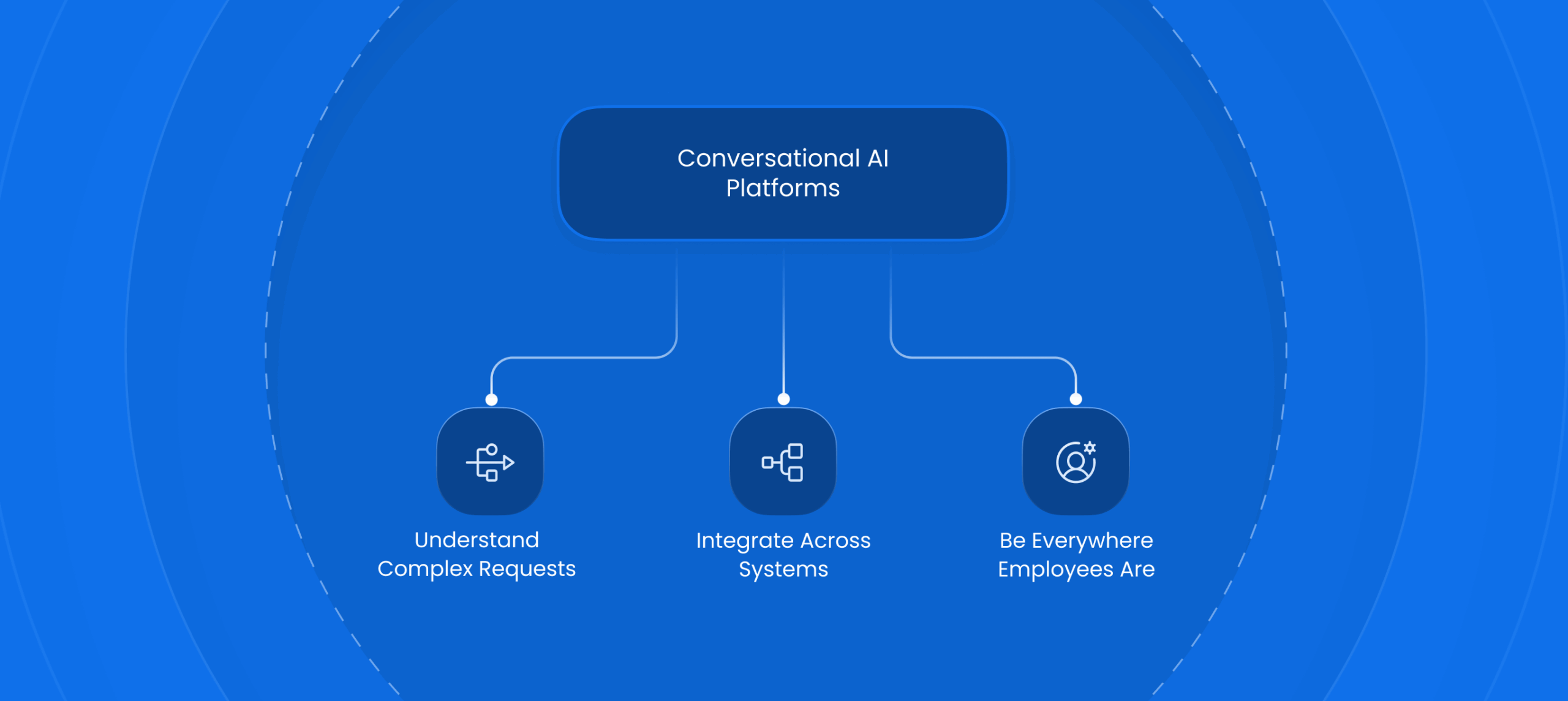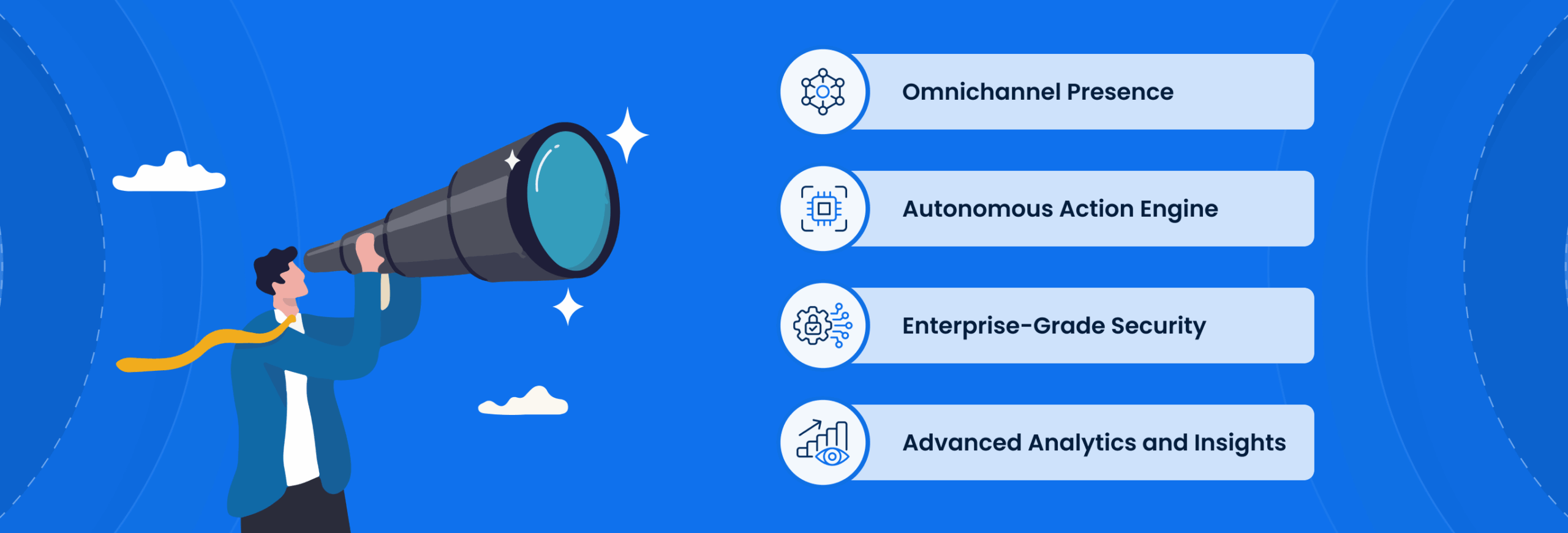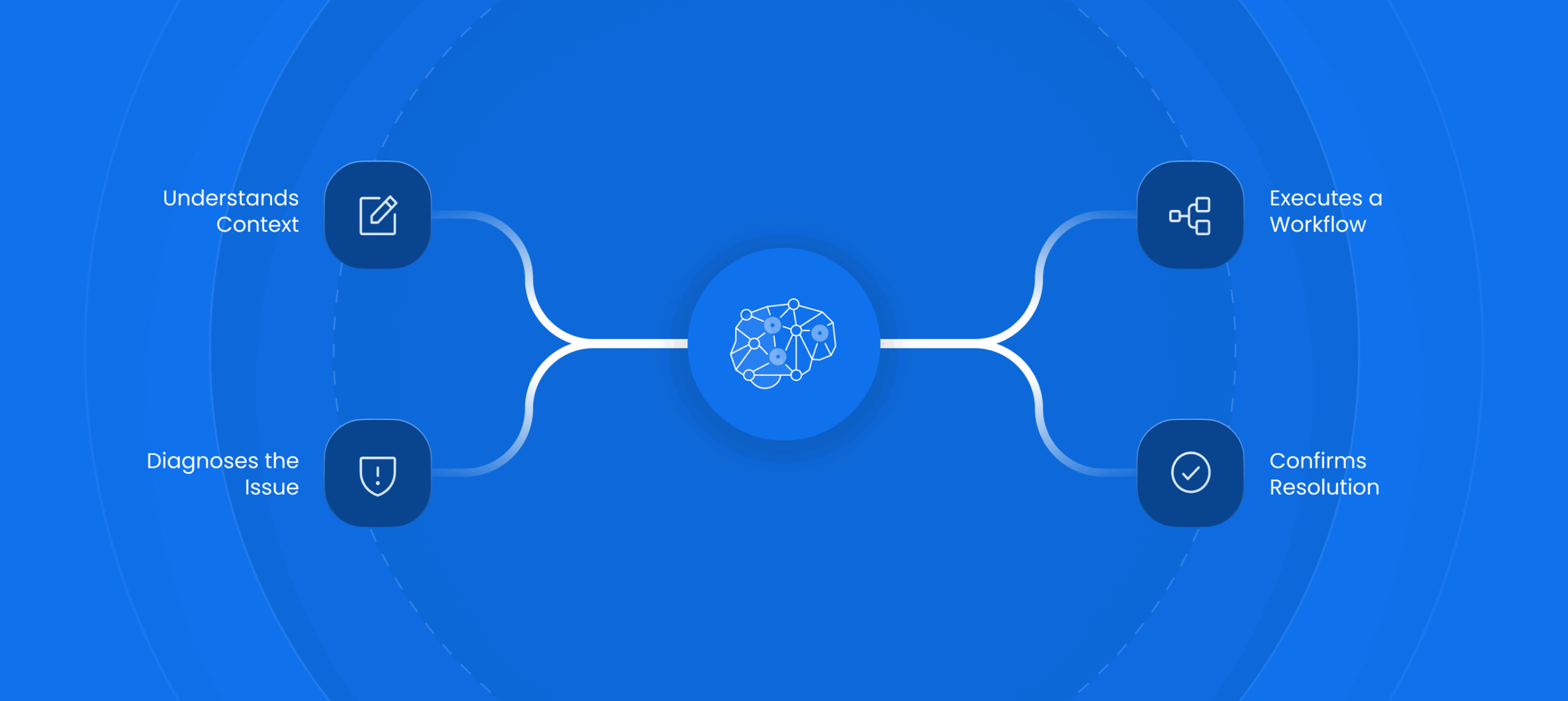Introduction
Your IT team is buried in tickets for password resets and software access requests. Your employees are waiting, productivity is stalled, and skilled engineers are spending their time on repetitive, low-impact tasks. This isn’t a headcount problem; it’s a workflow problem. The solution lies in a new class of technology that works alongside your team: conversational AI platforms. These aren’t the frustrating, rule-based chatbots of the past. Instead, think of them as highly skilled digital coworkers, capable of understanding context, taking action, and resolving complex issues on their own.
For technology leaders, understanding the strategic potential of modern conversational AI platforms is critical. This guide will cut through the hype to provide a clear playbook on what these systems are, the business value they deliver, and how they are evolving to become the central nervous system of the modern digital workplace.
Defining Modern Conversational AI Platforms
At its core, a conversational AI platform is a sophisticated software solution that allows humans to interact with computers using natural, everyday language. It’s the technology that powers the seamless experiences you have with advanced digital assistants.
What Are Conversational AI Platforms?

Think of conversational AI platforms as the central hub for all your automated enterprise conversations. A simple chatbot might live on your intranet and answer a few FAQs. In contrast, a true platform is a comprehensive system that can:
-
Understand Complex Requests: It uses advanced natural language understanding to decipher what an employee truly needs, even when the request is ambiguous or contains multiple parts.
-
Integrate Across Systems: It connects securely to your core business applications (like ServiceNow, Workday, or SAP) to access information and take action.
-
Be Everywhere Employees Are: It provides a consistent experience across multiple channels, including Slack, Microsoft Teams, email, and internal portals.
Essentially, it’s not just a tool for talking; it’s a platform for doing. It serves as an intelligent front door for employees to get help from any department, at any time.
Core Capabilities of Today’s Conversational AI Platforms
Not all platforms are created equal. The leading conversational AI platforms of 2025 are defined by a set of powerful, business-critical features that enable true automation and a superior user experience.
Key Features of Leading Conversational AI Platforms

When evaluating options, leaders should look for these key capabilities that separate a basic bot from a transformational platform:
- Omnichannel Presence: The platform must meet your employees where they already work. It should offer a seamless and consistent experience whether the interaction starts in Slack, moves to email, or is resolved within a self-service portal.
- Autonomous Action Engine: The ability to not just understand a request, but to act on it. This means the AI can independently execute workflows, such as provisioning software, resetting passwords, or processing an invoice, without human intervention.
- Enterprise-Grade Security: Leading platforms are built with a Zero Trust security mindset. They offer robust data encryption, secure integration methods, and strict access controls to ensure your company’s sensitive information is always protected.
- Advanced Analytics and Insights: A great platform doesn’t just resolve tickets; it provides strategic intelligence. It should offer intuitive dashboards that reveal trends, identify recurring issues, and provide actionable insights into employee sentiment and process bottlenecks.
The Business Case for Conversational AI Platforms
Implementing one of these systems is a strategic business decision, not just a technology upgrade. The benefits of modern conversational AI platforms create a powerful ripple effect across the entire organization.
Benefits of Implementing Conversational AI in Enterprises
The value proposition is clear and multifaceted, directly impacting both your people and your bottom line.
First, you’ll see a dramatic increase in operational efficiency. By automating the resolution of common IT, HR, and finance tickets, you free up your skilled professionals to focus on strategic initiatives that drive business growth. This leads to faster service delivery and a more agile support organization.
Secondly, these platforms deliver a significant and measurable return on investment (ROI). The financial benefits come from reducing employee downtime, deflecting a high volume of support tickets (which lowers operational costs), and avoiding the need to hire more staff to handle repetitive requests.
Finally, and most importantly, you will cultivate a superior employee experience. In a competitive talent market, providing a frictionless, consumer-grade support experience is a key differentiator. When employees can get instant, 24/7 help for their issues, they are more productive, engaged, and satisfied.
The Next Leap: Agentic Intelligence in Conversational AI Platforms
At Leena AI, we believe the future of conversational AI platforms is not just about conversation, but about autonomous action. We’re pioneering the use of “Agentic AI” to create digital agents that function as true members of your team.
How Leena AI Enhances Conversational AI with Agentic Intelligence
While many platforms can understand a user’s request, Leena AI’s platform is designed to resolve it from end to end. Our AI agent doesn’t just create a ticket when a user says, “I can’t connect to the VPN from my new laptop”; it takes ownership of the problem.

Here’s how our Agentic AI works in that scenario:
- Understands Context: The agent recognizes the user, their new device, and the intent (VPN troubleshooting).
- Diagnoses the Issue: It asks a few targeted, diagnostic questions conversationally.
- Executes a Workflow: It then securely connects to your IT systems to run tests, check the user’s profile, and reset their VPN configuration if needed.
- Confirms Resolution: The agent follows up with the employee to confirm the connection is working.
This entire multi-step process is completed in minutes, autonomously. This is the core value of our approach to conversational AI platforms: we turn them from passive assistants into active, problem-solving digital coworkers.
Integrating Intelligent Conversational AI Platforms
Adopting a powerful new technology shouldn’t require you to rebuild your existing IT infrastructure. The best conversational AI platforms are designed to enhance, not replace, your current systems.
Integrating Leena AI into Your Existing IT Infrastructure
We designed Leena AI to be a flexible and powerful intelligence layer that works seamlessly with your existing environment. Our platform is not a “rip and replace” solution.
Instead, it integrates deeply with your current IT Service Management tools like ServiceNow, Jira, and Zendesk, as well as your core HR and Finance systems. Leena AI acts as the intelligent front end, meeting employees in their preferred channels like Slack or Teams. It autonomously handles and resolves as many requests as possible. If an issue requires human expertise, our agent gathers all the necessary information, creates a perfectly detailed ticket, and routes it within your existing system of record. This approach allows you to gain the transformative power of Agentic AI while preserving your investments and established workflows.
The Future of Conversational AI Platforms
The evolution of conversational AI platforms is accelerating, driven by breakthroughs in large language models and a deeper understanding of enterprise needs.
The Future of Conversational AI: Trends and Innovations
Looking ahead, several key trends are shaping the future. The rise of Large Language Models (LLMs) is making conversations more natural, fluid, and context-aware than ever before.
A critical innovation for enterprises is the widespread adoption of Retrieval-Augmented Generation (RAG). This architecture allows conversational AI platforms to securely access your company’s real-time, internal data. This ensures that the AI’s answers are not only intelligent but also accurate, compliant, and grounded in your specific business context.
Finally, the most significant shift is towards proactive and predictive support. The platform of the near future won’t just wait for an employee to report a problem. It will analyze data to predict potential issues, like a server reaching capacity, and automatically create a ticket to resolve it before it ever impacts your workforce.
From Tool to Teammate
The journey of conversational AI platforms is one of remarkable progress, from simple Q&A bots to intelligent, autonomous digital coworkers. By embracing this technology, you can fundamentally reshape your support operations, turning them from a necessary cost center into a strategic engine for productivity and employee satisfaction.
Frequently Asked Questions About Conversational AI Platforms
1. What is the main difference between a chatbot and a conversational AI platform?
A chatbot is typically a simple tool designed to answer a narrow set of pre-programmed questions. A conversational AI platform is a comprehensive, enterprise-grade solution that can understand complex requests, integrate with business systems, and autonomously execute multi-step workflows across different departments.
2. How do conversational AI platforms ensure data security?
Leading conversational AI platforms are built with enterprise security in mind. They use data encryption, secure APIs, role-based access controls, and are compliant with major data privacy regulations. They are designed to operate securely within your existing IT infrastructure.
3. Can these platforms handle industry-specific jargon?
Yes. Modern conversational AI platforms can be trained on your company’s specific data, including internal documents and past support tickets. This allows them to learn the unique vocabulary, acronyms, and context of your business for much higher accuracy.
4. What kind of ROI can we expect from conversational AI platforms?
The ROI is typically significant and comes from multiple sources: hard cost savings from ticket deflection and automation, productivity gains from reduced employee downtime, and softer benefits like improved employee satisfaction and retention.
5. How long does it take to implement conversational AI platforms?
While this varies, modern, cloud-based conversational AI platforms are designed for rapid deployment. With pre-built integrations and proven implementation methodologies, companies can often go live and start seeing value within a matter of weeks, not months.













